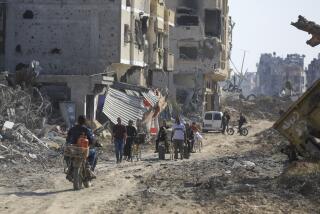Pounce on a Partial Pullout : Gulf crisis: If Hussein yields part of the stolen nation, Kuwait can breathe again and Iraq’s defenses are softened.
- Share via
The President and the secretary of state have warned us to expect an Iraqi ploy sometime before Jan. 15. Specifically, they fear a partial withdrawal from Kuwait that would leave Iraq with all of the Rumaila oil field, and with long-sought access to the Persian Gulf through retention of two small islands. This, they worry, would destroy the international coalition arrayed against Iraq and undermine U.S. domestic support for the use of force.
The Bush Administration’s view, from the beginning, has been that Iraq must not gain from its aggression--”not even one inch,” as the President has proclaimed. On the basis of this principle--and to keep the allies stalwart--the United States in recent days has tried to convince Saddam Hussein that nothing short of the total evacuation of Kuwait will eliminate the prospect of force being used against Iraq.
The principle is sound, but rejecting a partial restoration of Kuwait is not. The Administration underestimates the advantages and overestimates the danger. In fact, a partial Iraqi retreat would reduce Hussein’s chances of retaining any of Kuwait in the long run. It also would strengthen the will of the crucial Arab element of our alliance against Iraq. And because it would make any military coup de the a tre much less costly for us, it could bolster support on the home front.
Consider what a retreat of Iraqi forces to a line north of Kuwait City would mean.
First, the Sabah government would be restored; Kuwait would live again. Once the world saw close up and in living color the thuggery that Iraqi soldiers have perpetrated in Kuwait, international and U.S. domestic resolve to punish Iraq for its crimes would grow.
Iraqi withdrawal to the north would bring a halt to the physical destruction of Kuwait and its society, and what remains of the developed areas of the country would be spared in any future combat. In particular, if the Iraqis left without detonating the mines they have wrapped around Kuwait’s oil facilities, a sizable piece of the world’s oil-works would escape destruction--a near certainty if war breaks out under current circumstances.
More important, the military situation would change dramatically for the better. The Iraqis have built extensive fortifications in Kuwait for their immense occupying army. That army and its fire-primed trenches would have to be reassembled at the new northern line. This would be a great strain on Iraqi finances--assuming the embargo were still in force--and on military morale, for the redeployed forces would be exposed for some weeks until the effort could be completed.
While the Iraqis were relocating their defenses, the area vacated would be filled by U.S. and allied forces, bringing them closer to military targets inside Iraq. As a result, tactical options would change.
The only remotely intelligent way to liberate Kuwait now is to attack around it into Iraq. If Hussein withdraws to a new northern line, it becomes possible to drive Iraqi forces from Kuwait without traversing much Iraqi soil.
Most important of all, such a shift in military positions would save time and American soldiers’ lives in any eventual combat. A war under present circumstances would be extremely costly in casualties, given the intensely violent way the Joint Chiefs of Staff seem intent on fighting it.
Clearly, it is the contemplation of such costs that has produced the hesitation and division in domestic opinion. The prospect of a quicker and far less bloody war should bolster our domestic political nerve to finish the job militarily. If explained properly to the American people, the new conditions of a war should more than offset any impetus here at home to pursue a compromise diplomatic settlement.
Nor should we much concern ourselves with the attitudes of our Arab allies. It is not Kuwait that they care most about, but Iraq’s future capacity to menace them. If Iraq reels in concessions, the smell of full success will rise in the nostrils of Arab leaders in Riyadh, Cairo and Damascus, particularly so if success can be achieved at lower cost to them.
So let the Iraqis work a ploy of partial withdrawal if they like. We need not fear it. Indeed, we should invite and pocket as many Iraqi concessions as they will give us, but offer none of our own in return. Instead of emphasizing the principles of U.S. policy--”not one inch”--President Bush should be saying that we want a peaceful solution and that he welcomes all movement in that direction.
It’s useful to let Saddam Hussein hope that we’ll back down from using force in the end if he feeds us enough concessions, so long as we know we won’t. That’s how we got our hostages back, after all.
A partial Iraqi pullback from Kuwait would not prevent war. All evidence suggests that Hussein will eventually draw a final line short of total withdrawal, and that is unacceptable to us. But to the extent that this line is closer to the Iraqi border with Kuwait than the Saudi one, the United States and its allies can--and should--strike from a position of relative military and political advantage.
So, go ahead, Saddam Hussein, make our day.
More to Read
Sign up for Essential California
The most important California stories and recommendations in your inbox every morning.
You may occasionally receive promotional content from the Los Angeles Times.










